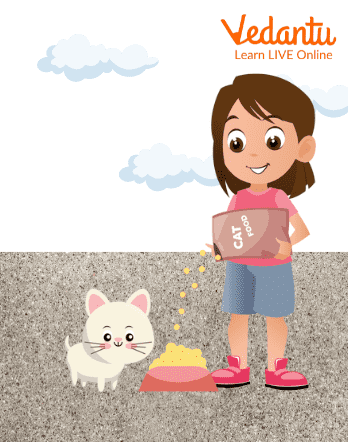Introduction
Do you have any pets? If you have a pet then you will definitely love your pet. You always used to feed them on time and take them on walks. In this article, you will learn about “kindness” to animals, not only your pet or domestic animals but kindness to all animals, through a poem.
The poem is about how we must display love and kindness to all animals around us. The poet of the poem has stated how glad the animals get if humans are able to guarantee them an environment in which they can move freely with no experience or worry of harm.
Joseph Ashby-Sterry is the poet of this poem and he has also given instances of ways people must be treating animals.

Kindness to Animals
Kindness To Animals- Poem
The Theme of the Poem
The poem highlights the importance of kindness and empathy closer to animals. Just as human beings enjoy feelings of joy, pain, loneliness, anger, hate, and other such feelings, animals do have such emotions. Animals can not express such feelings so it turns into our innate responsibility to broaden feelings of compassion and empathy towards animals. It would no longer best make us correct people but model citizens too.
Refrain 1
Little children, never give
Pain to things that feel and live.
Let the gentle robin come
For the crumbs, you save them at home.
As indicated by the writer, kids never hurt creatures intentionally. That is a direct result of their good nature. Youngsters have empathy for whatever is living and have sentiments. The artist maintains that everyone should be as merciful as the kids towards all living creatures including the animals and allow them to have the food or extras as opposed to discarding them.
Refrain 2
As his meat, you throw along
He’ll repay you with a song.
Never hurt the timid hare
Peeping from her green grass lair.
The thoughtful gesture is sufficient to make the robin (a creature) cheerful and fulfil it and pay us back with a pleasant tune. We ought never to hurt the unfortunate bunny. The rabbit is supposed to peep from the green grass, where it has its concealing spot.

Child Feeding The Cat
Refrain 3
Let her come and sport and play
On the lawn at the close of the day.
The little lark goes soaring high
To the bright windows of the sky.
We ought to allow creatures to play joyfully in the open without the apprehension about getting injured. With practically no concerns, playing in the open and on the grass before the day's over ought to be capable. The little warbler (a bird) is soaring overhead with its untried wings.
Refrain 4
Singing as if it were always spring
And fluttering on an untired wing
Oh! Let him sing his happy song
Nor do these gentle creatures wrong.
The warbler is flying and singing as though it continuously sprung. The cheerful melodies sung by the warbler make us feel that it is continuously springing around us. The writer has asked the readers to never hurt any of these honest animals. They chose whatever is best, so we shouldn't hurt them too. They ought to have the option to sing their blissful notes and carry on with their life.
Summary
The author uses the image of a small songbird flying up into the beautiful sky as a powerful metaphor. It sounds happy as if it were a typical spring day. The small singer has a lot of personality, so he doesn't get bored singing and flitting around all day. As a result, the author urges the kids to let him sing his happy song and never "foul up," that is, never damage or kill these precious animals.


FAQs on Kindness to Animals Poem
1. Why is it important to treat animals with kindness?
Helping animals makes us more human and makes us happier. It also aids in our recovery from sadness and trauma. Here are a few ways that treating animals well makes us feel better.
Animals need your love and care only and they return it in the form of love, care, and affection.
Kindness toward animals can save a life of living things that can’t speak their needs like human beings.
2. How do you take care of an animal?
Animals require wholesome food, pure water, and a cosy place to sleep. The majority of animals need frequent exercise to keep healthy. Making a commitment to the animals is crucial to their care since they are living, sentient beings, not just accessories. They require care, training, nourishment, and love. We can take care of them by providing all these things.
3. What is the message this poem gives toward animals?
The poem gives a message to “Animals” that human beings have lost innocence, fraternity, and peace. They usually devote sins, have greed for worldly things and also discriminate on the basis of class, faith, caste, colour, and so forth. On the other hand, animals have retained the best qualities





